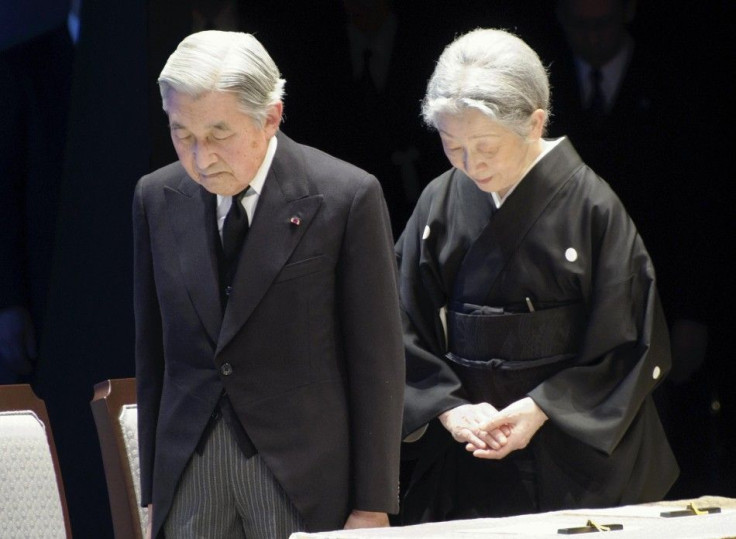Japan Mourns on One-Year Anniversary of Devastating Earthquake-Tsunami

Japan is marking the one-year anniversary of the worst catastrophe the nation has suffered since World War II -- the devastating earthquake-tsunami that killed at least 16,000 people and created a nuclear emergency unprecedented in its scope and impact.
The magnitude-9.0 earthquake that struck the country’s northeastern coast also unleashed a tsunami that triggered a dangerous radiation leak at the Fukushima Daiichi plant.
The extraordinary tragedy not only led to a heavy loss of life, but also devastated entire parts of the country, brought down a government, and raised serious doubts about the country’s future use of atomic energy.
A 20-kilometer radius around the crippled Fukushima plant became a no-man’s land, forcing the evacuation of tens of thousands of people, most likely permanently.
Across the country, people observed a minute’s silence at 2:46 p.m. (local time) -- the moment the earthquake struck. Thousands of people commemorated the dead with bells and prayers.
We shall never forget those who gave their lives in rescue missions. We shall not let our memory of the disasters fade,” said Emperor Akihito, at a memorial service in Tokyo’s National Theatre, which was also attended by Empress Michiko and Prime Minister Yoshihiko Noda.
I hope all the people will keep the victims in their hearts, the 78-year-old emperor added.
Noda vowed that Japan will rebuild itself and become “an even better place.”
I am filled with a sense of grief when I think about the regret for those who passed away and the deep sadness of families who have lost their loved ones, Noda said.
We will stand by the disaster victims during these difficult times and work together to fulfill the historic mission of reinvigorating Japan through reconstruction.
The Prime Minister also pledged to completely decommission the Fukushima plant and to reconstruct the northeastern coastal areas that suffered the worst damage.
The Japan Times newspaper reported that in the badly damaged coastal city of Ishinomaki in the Miyagi prefecture, Mayor Hiroshi Kameyama told a crowd of mourners: We lost more than 3,000 residents, the greatest loss of life in any of the disaster areas. Although the Self-Defense Forces, police and rescue workers continue their search efforts, it is still hard to believe so many remain missing, he said.
According to official reports, 15,853 people died in the double-tragedy, 6.023 are injured and 3282 still remain missing or unaccounted for. More than 333,000 people are still residing in evacuation centers.
On a cost basis, the government’s cabinet estimates the final damage amounted to some 16.9 trillion yen ($243 billion). By comparison, the damage wrought by Hurricane Katrina in the Gulf Coast of the United States in 2005 totaled about $125 billion.
The National Police Agency of Japan indicated that nearly 300,000 buildings were damaged by the catastrophe and almost 1 million were damaged in some way. Also, 4000 roads were damaged, along with 78 bridges and 29 railroads.
Japanese officials estimate that the total cost of reconstruction will total about 23 trillion yen over the next decade.
Naoto Kan, the prime minister at the time of the quake, was heavily criticized for his government’s failure to respond to the crisis in a timely and efficient manner. He was forced to resign from office in August 2011.
Meanwhile, tens of thousands of people remain traumatized by the tragic events of last March.
On a more practical nature, millions of tons of debris still need to be cleared away. Kumi Kawamura, a resident of Ishinomaki and member of a local environmental group, told Japan Times: Some people are doing OK, especially those in the real estate business or in some service industries. But elderly residents, and especially those in the agricultural and fishing industries, were hit particularly hard.”
In his speech at the Tokyo ceremony, The emperor also said: I believe that the road to recovery of the disaster area will be filled with difficulties. I hope that all of the people of Japan will sympathize with the disaster victims and that persistent efforts will be made to improve the situation. I believe it is important not to forget the memory of this major disaster and we should pass it down to the coming generations, fostering awareness toward disaster prevention and aiming to become a safe country.
© Copyright IBTimes 2024. All rights reserved.











